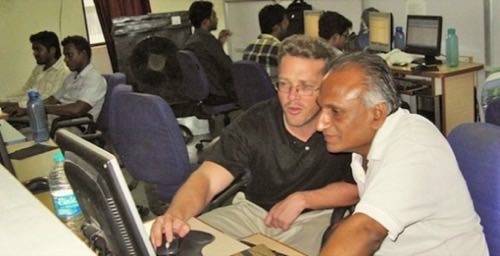
Feeling adventurous? If simply creating a start up isn’t exciting enoough for you, try doing it outside the borders of the United States. You might find that the advantages outweigh the added excitement.
There are plenty of good reasons for starting up a company abroad. Your new company may be targeting an overseas market, or you you could be in search of a more affordable labor pool or less government regulation. And some countries – like Chile, for example – offer startups significant financial incentives.
Whatever your reasons, in addition to everything required for a domestic startup, doing it in a foreign environment requires a lot of extra research, a good deal of patience and – as always – a bit of luck.
The most important preparation is to be aware of what you’re getting into. Let these real-world experiences be your guide:
India, to get more for your money

David Urmann, who started developing websites after grad school, decided to start his social travel business Touristlink in India. “As an Internet business, I had a fixed amount of revenue coming in monthly that was not location-dependent,” he explains. “I figured if I set up business in India I would be able to have a much larger staff, and grow the business much faster.”
If you want to follow Urmann’s lead, start by assessing possible locations. Think about what customers expect from your business, how you’re going to market your business, your competitive set, what labor pool and infrastructure exists in the country you’re targeting, and what permits and licenses you need.
Amsterdam, because it’s a great place to live
That’s what David Sampson did several years ago when he chose Amsterdam as the home for Cloud Provider. Samson says, “Amsterdam has brought us a very advanced pool of technical resources, and additional… support that allow us to have better availability to our customers.” Samson advises tech companies to consider Asian markets as a place to start: “They offer a significant pool of talent as well as a very large population that would like to take advantage of new goods and services.” Once the concept proved out, Sampson started Cloud Provider USA back in the States. And unlike most overseas founders, he never actually lived in Amsterdam, but hired a team there and visited often.
Of course, it’s also important to choose a city where you want to live. “As the founder of an overseas business, you are going to be spending a lot of time wherever you start up,” says Urmann. “This should be a factor even if doesn’t seem like a real criteria when you first set out.”
Whatever country you choose, it’s smart to start with a local partner who can help you set up. Urmann found his initial partner by searching online. Your partner needs to be “well connected and a hustler,” says Urmann. And don’t feel obligated to stick with that initial partner past setup. “I think once you’re actually working alongside people and solving problems on a day-to-day basis, it’s much easier to identify a good potential partner.”
Urmann’s initial partner “only lasted a few months. I developed a close relationship with one of the initial employees I hired, who has now been working with me for a number of years and ended up being a great choice.”
Paris, for obvious reasons
Meryl Job, the founder of Videdressing, a social marketplace for high-end fashions based in Paris, agrees, and feels “very fortunate” to have a French business partner with “a very solid knowledge of the French legal and business environment. He took care of all formalities related to the creation of the company.” Job, who will soon expand operations to the U.S., adds, “There are aspects of starting a company in France that could seem difficult to someone who isn’t French. The laws and regulations are different. [My partner’s] knowledge of the French business environment was very helpful.”
You also need to be ready for unforeseen problems. What you take for granted in the U.S. might not exist overseas. “I didn’t count on the extra infrastructure costs and downtime,” explains Urmann. “I had to invest in a back-up generating system, and we had a lot of issues with getting a good Internet connection when we first started, but were able to resolve the problems by moving our office to a government-backed IT park.”
To best navigate local customs and regulations, it’s smart to get to know the people in charge. “If anything, the local officials are usually helpful and supportive,” says Urmann. “Sometimes things do move slowly, and you have to have a certain amount of patience. And, it always helps if you have friends with good connections.”
Learning to fit in
Urmann, whose Touristlink site had $2 million in sales last year, advises you take the time to appreciate the differences in conducting business and learn how to fit in with the locals. “If you start a business like I did, in a place where not a lot of foreigners live, you will probably attract a lot of attention. This can be good and bad. On the positive side, you might be able to arrange meetings with important people who may not have ordinarily met with you. On the downside, sometimes these meetings might just be for the sake of curiosity.”
Are you planning to eventually move your business to the U.S. or expand to the U.S.? Think ahead so your transition won’t be too difficult. “My choice to move overseas actually had a much larger impact on how the eventual business would develop than I realized that at the start,” says Urmann. “For example, I have 60 desktops and they all rely on a backup power system. If I had to buy the same equipment again, I might put more laptops into the mix.”
Perhaps the only way to truly know what it takes to start a business overseas is to do it. “As a graduate of the Northeastern University EMBA program, I had traveled overseas, and had exposure to international business,” says Sampson. But, he adds, “Nothing can truly prepare you for this experience other than the experience itself.”
Pictures courtesy of TouristLink.










